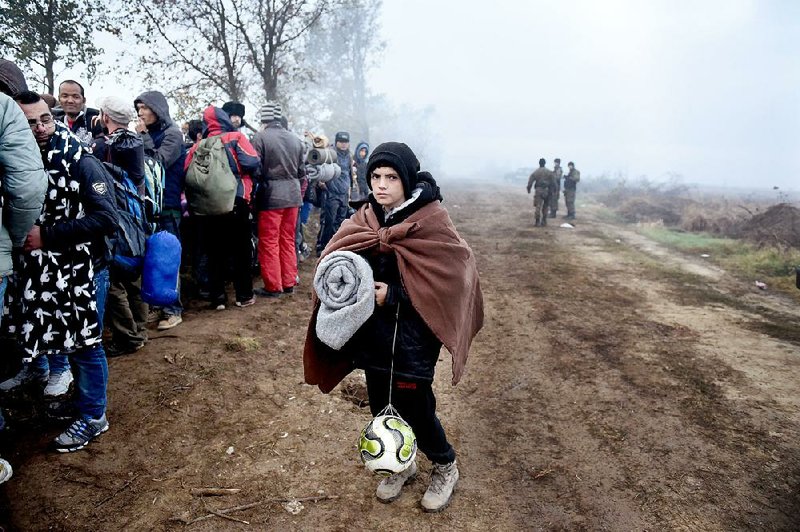IDOMENI, Greece -- Hundreds of protesting migrants whom Macedonia refuses to let in because it does not consider them legitimate asylum seekers are blocking a railway line at the Greek-Macedonian border.
Greece's railway company said 10 scheduled freight train departures for Macedonia have been canceled over the past day because of the protest.
Up to 1,000 people, mostly Iranians, Pakistanis and North Africans, have erected tents around the railway line and are blocking the tracks. Macedonia is allowing in only nationalities that it considers legitimate refugees -- Syrians, Afghans and Iraqis -- some 400 of whom entered the country Friday.
"I've been here for two days," said Elyas, 28, from Iran. "I want to join my family in England. They are expecting me."
Fellow Iranian Mehdi, 19, held up a placard that read "Where is humanity?"
"Are we Iranians not human?" he said. "How can the Germans accept us, and not these people [Macedonians]? I am a Christian and face persecution in my country."
Neither gave a surname, citing fear of Iranian authorities.
Iranians and others have been stuck in Idomeni since Macedonia and other countries on the Balkan refugee corridor adopted the new policy Thursday.
Those let through continue north by train from Macedonia's nearby Gevgelija station, heading for Germany or other wealthier European Union nations.
Also Friday, Macedonia's prime minister spoke with his Hungarian counterpart, who said uncontrolled migration poses a "direct risk" to all European citizens and has already claimed lives in the continent.
Viktor Orban, speaking after a meeting with Macedonian Prime Minister Nikola Gruevski, said it was "politically irresponsible" to continue allowing migrants to enter the EU unchecked, since they "may or do commit acts of terror."
Hungary has diverted the migrant flow by building razor-wire fences on its borders with Serbia and Croatia.
Gruevski said the flow of some 10,000 migrants a day had become a "constant burden" on Macedonian resources and called for greater cooperation between the Balkan states and the EU to solve the crisis.
Macedonia, along with Serbia, Croatia and Slovenia, has begun turning away migrants who are not from war zones such as Syria, Afghanistan and Iraq.
In Romania, border police have tightened controls in response to possible threats, leading to long lines of waiting vehicles at the country's borders.
The Romanian police said border controls had been temporarily increased "to prevent people from conflict zones who could carry out activities that are a real threat to internal and foreign security." They did not elaborate on the possible threats.
The Digi24 television station reported the increased controls began late Thursday and the drive across the border at Nadlac into Hungary was taking more than three hours. Lines stretched for 4½ miles.
Romania is not on the path that hundreds of thousands of asylum seekers have been taking through the Balkans to get to western Europe.
Some in the U.S. have sought ways to contribute to relief efforts after learning of the plight of people crossing the Mediterranean Sea.
Just months after beginning a new job with Kaiser Permanente in Gaithersburg, Md., American physician Meena Hasan recently spent a week of her vacation volunteering with Salaam Cultural Museum, treating people arriving in Lesbos, Greece.
"I felt like I needed to help," Hasan said. "I felt like I needed to make a difference and do my part."
Hasan says she provided a range of care, from treating colds and giving out medications for diabetes or high blood pressure to performing CPR on people injured in boat accidents.
Despite the migrants' harrowing journeys, Hasan said she noticed their resilience and gratitude. That's made it tougher for her to hear negative comments about refugees since her return to the United States.
"It is so sad to hear the rhetoric that I'm hearing now in the media and amongst Americans," Hasan said. "I strongly believe that if they had the opportunity to interact with just one [refugee], their attitude would change."
Hasan urged Americans to look past the divisive comments and see the humanity she sees in the people she treated.
"It's very easy to get caught in the numbers that we hear on the news, but really just try to understand that each number is a person, just like you and me."
Information for this article was contributed by staff members of The Associated Press.
A Section on 11/21/2015

